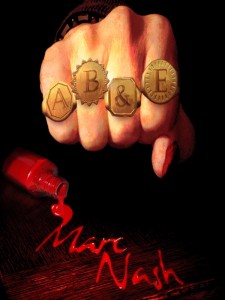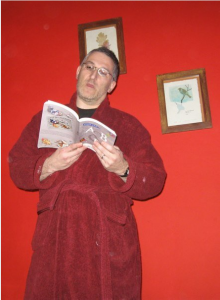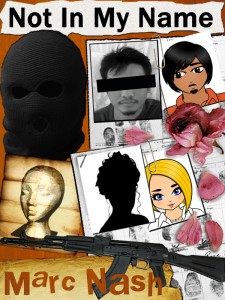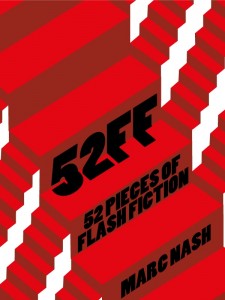Author Interview With Marc Nash
I write novels and flash fiction. They are what people would probably describe as literary, in that language is a very important element in the books, but in truth I find it impossible to sum up my fiction. Each project is different and demands its own approach. How would you describe yourself in a short third person bio?
Conceptual, curious, contentious, candid, contemplative, curmudgeonly, compassionate, Casuist and lover of the letter ‘C’. Living in London!What made you initially want to write? Has your motivation changed since then?
I started out writing stage plays because I was disillusioned at university and ready to drop out, but there were free theatre stages and lots of budding actors there for me to learn my craft. I only stopped writing plays when my twin boys arrived and I couldn’t hang out at theatre bars anymore. So I started writing novels. That’s been the biggest change, but it’s only a matter of slightly different art forms. It’s still wrangling and wielding words. What do you think is the most important part of writing?
The original idea for the book. It has to be a bit different from all the other books out there. For me any book takes shape when the central image or metaphor marries up to the voice of the main character. Both have to be unique to my mind, then I let the words take over.What is your favourite part of writing?
That first draft, when the whole thing is plastic and can go in a myriad of directions. After that it’s just editing, which while vital, doesn’t have nearly anything like the creativity that the first draft does. Also I can listen to music while I’m writing the first draft, let it seep into the work. But no music thereafter when I have to concentrate on the detail to pick out the errors.Tell us an interesting fact about you. I managed my twin boys’ soccer team for two years. That was way more stressful than anything to do with writing. I have also given a reading in character, dressed as a female nurse.
Yes I’m the Finance Director for an NGO that monitors abuses of free expression around the world. The Maths leaves the word side of my brain free for writing in the evening!Are you an indie author, or did you get your work published the ‘traditional’ way?
Indie 100%! I don’t think a conventional publisher could anticipate making much money out of me, my books are too ‘out there’ for the mainstream bucks.Tell us a little about your novel, ‘Not In My Name’.
As a Londoner who doesn’t drive, I was affected by the suicide bombings on the London Underground in 2005. The bombers had all grown up in the UK and I wanted to trace how that might happen, to be so alienated from your country as to declare war on it and attack. I also wanted to look at suicide itself and compare it to the motivations behind the political act of suicide. It’s a book with plenty of ideas from all parts of the political spectrum, but one that doesn’t take sides.Which projects are you working on at the moment?
I’m about to publish an Urban Science-Fiction Romantic Comedy “Time After Time” in September, based loosely on “The Terminator” movies. It’s very funny and quite dark. I’ve written the odd science fiction short story, but this is my first venture into novel length Sci-Fi. Also there’s going to be a link to a playlist of all the songs referenced in the book for readers to listen to which would be quite neat I think. The other thing I need to get off the ground is a project to animate one of my flash fiction stories called “How One Of Them Remembers The Conversation” and to collaborate with a video maker and scratch DJ. The aim would be to project the video and have me and a DJ perform live to it.
 How do you come up with the titles for your books? And do you have the final title before completing your book, or after?
How do you come up with the titles for your books? And do you have the final title before completing your book, or after?
 How do you come up with the titles for your books? And do you have the final title before completing your book, or after?
How do you come up with the titles for your books? And do you have the final title before completing your book, or after?They nearly always suggest themselves from the writing, but that can happen at any time during the process. I usually have a working title while I’m writing, but rarely will that remain the final choice. The Sci-Fi novel found its name from a song mentioned in it. “Not In My Name” came from a movement protesting the Second Gulf War. Some of my flashes actually start their life by proceeding from the title. How has writing changed your life?
That’s a really hard question as I don’t know what my life might have been without it. I always promised my wife I would meet my responsibilities, which means I’ve never not worked for a living. I’ve tried to give writing up a couple of times over the years, but those ideas still come knocking at your head in the small hours of the night, making you excited and enthused all over again. Once a writer, always a writer I think. And it’s 24-7, I’m always switched on and on the lookout for things, even if I’m engaged in other activities.
Where do you get inspiration for writing from? Do you listen to music whilst writing or have a ‘writing cave’?
I wish I had a writing cave! Or just a study with a desk and my books around me, but they’re out in a shed at the bottom of the garden because the house is so small. I gave the study room up to my twin boys. So I sit on my bed writing on a laptop. And music is key to my writing as I hope I’ve suggested above. I always work out a playlist for each novel and then play that without deviating from it, because that way it takes me straight back into the novel from where I left off writing it on the previous occasion. The inspiration comes from everyday life and just being observant and curious to get behind the surface of things. My playwriting days gave me a good grounding in writing character, so it’s the images and associations of ideas that inspire me. In my first flash fiction anthology, I list all the prompts and inspirations behind each story. Several came from just observing people on trains, buses and in supermarket queues.
Is there a particular form, style or genre that you’d like to have a go at writing? Why?
Is there a particular form, style or genre that you’d like to have a go at writing? Why?
I don’t really think of my writing to be of any genre or style, but I know it doesn’t really matter what the subject or theme, it’s pretty much uniquely recognisable as ‘mine’. The words and the ideas determine the form of the story and I’m happy with that. I would like to do a book where the design and layout of the words and the typography was something I could do radical things with, but don’t really have a project in mind for that yet. Favourite book and/or author(s)?
Franz Kafka, Jonathan Lethem, Jeanette Winterson, William Burroughs, Don Dellilo, David Peace, Albert Camus, Dubravka Ugresic
Absolutely not. Although I do have one, it’s in History and the one thing I don’t write is Historical Fiction! I was a typical boy being more interested in sports, so I’d never even read a novel until I was 14 years old. And what turned me on to reading? You guessed it, music! A cool older cousin suggested I listen to a song by The Cure called “Killing An Arab” and then read the Camus book “The Outsider”, both of which I dutifully did and I’ve devoured literature ever since. My High School English Literature teacher told me after my first assignment that I worked too hard to get a Grade C, but didn’t show the necessary understanding to get an A and he was absolutely right, I got a B in the exams. I write the stuff that I don’t see out there in the market all that much because it’s what appeals to me. So I’m really self-taught. What would you say to those who want to become a writer? Any advice?
Go for it absolutely, but work out what being a writer means to you. Is it to make money, to be famous, to entertain people, to make your family proud of you, to prove people wrong, to get your message out, to write the books you want to write, or to do whatever it takes to be widely read and so on? Whatever it is, just be honest in your assessment of how you’re matching up to your vision of being a writer. And be realistic about it, rather than treat it as a dream or an aspiration. Thank you very much for your time.
Thank you for the opportunity. There were some tough questions mixed in there!



